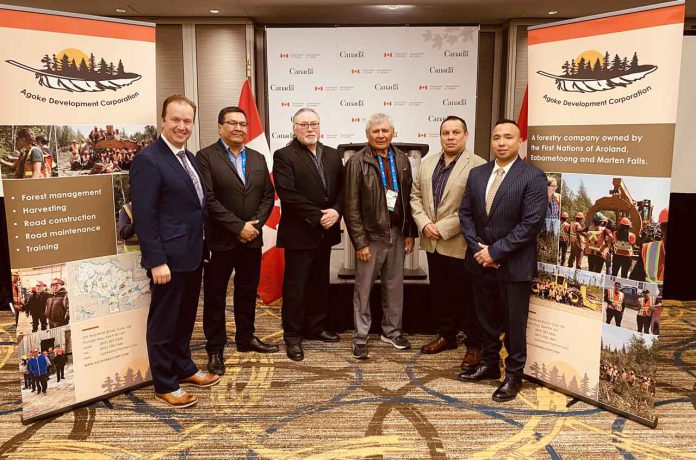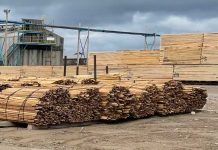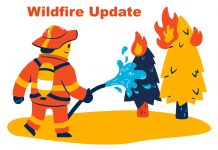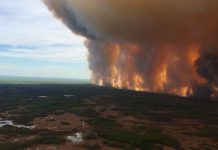2020 marks the centennial anniversary of National Forest Week, a campaign led by the Canadian Institute of Forestry, the Agoke Development Corporation (Agoke) is taking the opportunity to celebrate key milestones with indigenous participation in forestry. Agoke is also making a call out to the Ontario government for treaty implementation for the sharing of benefits and management rights of their traditional lands through a long-term management licence for the Ogoki Forest.
Since 2018, the forestry enterprise owned and operated by the First Nations of Aroland, Eabametoong, and Marten Falls has been managing the Ogoki Forest in Northwestern Ontario. Agoke staff have a lead role in many areas including the oversight of road infrastructure, forest management planning, and developing silviculture programs while protecting culturally sensitive areas and animal habitats. Now, Agoke is setting its targets on a long-term forest management licence for the crown unit and are eager to discuss their intentions directly with Minister Yakabuski’s office.
“In order to unleash the full economic potential of our First Nation communities and businesses, we need a long-term wood supply agreement that matches our long-term vision”, said Bill Spade, Eabametoong Director for Agoke. “Access to capital for logging and hauling expansion needs to be in place to sustain our business over the course of the next 10-year forest management plan. We are calling on the ministry to consider our plan for a long-term forest management licence that charts a clear win-win for ensuring our rights are upheld, business certainty is achieved, and economic benefit flows to local communities. ” Spade added.
In the fall of 2017, Agoke began work on the next 10-year Ogoki Forest Management Plan with the Ministry of Natural Resources and Forestry and other planning team representatives. This has been a learning experience for the First Nations appointees on the planning team with their efforts to voice the concerns of indigenous peoples to strike a balance of the social, economic, cultural, and environmental factors in the long-term direction of the forest. The three First Nations of Aroland, Eabametoong, and Marten Falls are primarily impacted and share a compelling common vision of resource development that exists within ecosystem limits and in which people, forests, species, and businesses thrive.
“There has been long planning team meetings and discussions at the community level about the need for the government to support and prioritize First Nation’s interests in the development of forest management plans. This is crucial and something that was not always done in the past. We believe the work that we have done has raised awareness and improved overall support of the socio-economic factors, well-being, and concerns of the peoples of the land. By having more involvement in the planning team, it provided our peoples with a voice to align harvesting and silviculture with other infrastructure needs like road development. This holistic and community-driven approach adds value to the plan.” stated Lawrence Baxter, Marten Falls Director for Agoke. The next 10-year forest management plan is approaching the final stages of approvals and is set for implementation in early 2021.
With the potential for all-season road development in the region, Agoke is working on training partnerships to build capacity to expand its logging and road construction operations in the Greenstone region. Agoke sees it as imperative to work with key partners like Nakina Lumber Inc. and Columbia Forest Products, as their milling operations are traditionally important components of the supply chain.
“We work with a true partner at Nakina Lumber Inc., they definitely understand the social issues in our First Nations and are looking to help improve the quality of life of our peoples,” stated Bernard Gagnon, Aroland Director for Agoke. Anyone that is eager for doing something positive in their life, can get a chance to work in our operations. We have seen many people come from unemployment to trained and promoted in the Nakina sawmill. We have also seen people move into skills trades apprenticeships on their way to being certified millwrights, and electricians. These are good-paying jobs that will set the stage for them to become role models for our youth,” Gagnon added.
Nakina Lumber Inc. can attest to the value of the partnerships with indigenous communities as over 80% of the sawmill production staff are from the local First Nations. “Working with the Agoke board, staff, and getting to know the families from the communities has been a source of inspiration for all of us at Nakina sawmill management to keep going,” stated Susan Buchanan-Brown, of Nakina Lumber Inc.
Nakina Lumber Inc. has been resilient during the impacts of the COVID-19 pandemic, as lumber shortages across North America have led to price increases for the raw material. “Global production will catch up with increased demand, but it will take a number of weeks or months as the shortage has been mainly due to curtailments and production coming offline in Canada earlier this year due to COVID uncertainty and challenging markets,” stated Tom Darechuk, President and CEO of Nakina Lumber Inc. “Our goal right now is to work with our partner – Agoke to keep wood moving and people working”, Darechuk added.
Over the next few years, Agoke is looking to expand its regional training initiatives to support heavy equipment operators, truck drivers, and field mechanics. This will require support from the Ministry of Labour which recently announced $37 million for training funds into construction and skilled trades across the province. “Recognition that the forest sector is an essential industry that is a main driver for COVID economic recovery and job creation in Northern Ontario is why we will need from the government in our training strategy”, stated Colin Shawinimash, Workforce Development Officer at Agoke.
Agoke also has other special projects in the works like a feasibility study of carbon off-sets to tackle climate change and research on biomass feedstock to help scale capacity for micro-grids and energy sovereignty in the Far North. With technological advancements being made, there is an opportunity for Agoke to innovate and partner with renewable energy developers for combined heat and power systems in Northern Ontario.
Agoke has been recognized for its business performance in the forest sector. In 2018 it won Partnership of the Year at the NADF Business Awards, then in 2019 Excellence in Business at the Northern Ontario Business Awards (NOBA). In 2020, the Ontario Forestry Industry Association (OFIA) honored Agoke with the Forest Champion of the year award.
About Agoke Development Corporation
The Agoke Development Corporation is a forestry company that consists of Aroland, Eabametoong and Marten Falls First Nation. The Agoke Development Corporation started in 2015 with the intent to build capacity in forest management and to maximize economic opportunities in the forestry sector. In the true spirit of reconciliation, the Agoke board is setting out to change the name of the forest from the MNRF’s word ‘Ogoki’ to ‘Agoke’, named after the corporation. The name ‘Agoke’ came from an elder and is the Ojibwe word for the area meaning “hidden land”.
About the Ogoki Forest
The Ogoki Forest is located 400 km north-east of Thunder Bay immediately east of the Wabakimi Provincial Park and is approximately 10,900 km² in size.
About the Canadian Institute of Forestry – National Forest Week
The one-week campaign takes place the last week of September each year challenges Canadians across the country to learn more about the forest sector and its significance to Canada’s culture, history, and future, while also supporting a greater recognition of forests as a valuable, renewable and green resource. This year’s theme is “Healthy Forests, Healthy Future”, focusing on the importance of safeguarding the health of Canada’s forests as a critical nature-based solution to mitigate climate change. Forestry communities understand that a healthy forest can mean family-supporting incomes for forestry workers, manufacturing companies and others in the forestry supply chain, opportunities for small, locally owned businesses and economic development for Indigenous communities.






